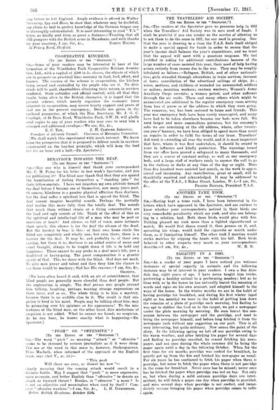BEHAVIOUR TOWARDS THE DEAF.
ITo THE EDITOR OF THZ " SPECTATOR.") Ste,—May one wino is himself deaf thank your correspondent Mr. C. M. Paine for his letter in last week's Spectator, and you for publishing it? The blind may thank God that they are spared the humiliation of feeling themselves a "standing joke" for their fellow-mortals. I have not forgotten my own attitude toward tine deaf before I became one of themselves, now many years past. If course, blindness is a greater physical affliction than deafness, but the cleat suffer a spiritual loss that is spared the blind. The deaf cannot imagine beautiful sounds. Perhaps the partially deaf realize this more fully than the totally deaf. The sounds that reach them without strain or a tiring concentration are the loud and ugly sounds of life. Think of the effect of this on tine spiritual and intellectual life of a men who may be poet or musician at heart! And silence, so full of voice, more intimate than speech, this silence is for the deaf the silence of the dead. But the hardest to bear is this: of their own home circle the blind are completely and wholly one; but even there, there is a barrier for the deaf. It may be, and probably is, of their own raising, but there it is; deafness is an added source of mean and cruel thought, always to be fought down if life is to bold any happiness. There cannot be any peaks in a deaf man's life, jest a dead-level of heavy-going. The great compensation is a greater surety of God. This we share with the blind. God does not mock. To give man power and talent and then deny him the chance to use them would he mockery; God has His reasons.—I am, Sir, Ac.,
GRATEFUL.
[We have often heard it said, with an air of astonishment, that blind people are generally more cheerful than deaf people. But tine explanation is simple. The deaf person sees people around him talking, laughing, perhaps wearing strange expressions on their faces, and so oil. The whole thing is to him a mystery, because there is no audible clue to it. The result is that sus- picion is bred in his mind. People may be talking about him, may Inc grimacing over his opinions or his appearance! To the mis- fortunes of the blind man, on the other hand, this misfortune of suspicion is not added. What he cannot see breeds no suspicion. As he can hear, he knows exactly what is happening.—En. Spectator.]














































 Previous page
Previous page